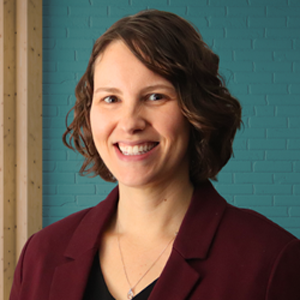A new initiative at St. David Anglican-Lutheran Church in Orillia is reaching out to a group in its local community that is notoriously underserved: children with autism.
Erica Duffy, a member of the parish, got the idea from her own experience as the mother to a nearly 3-year-old daughter with autism. While autistic children are usually integrated with their neurotypical peers in settings like school, Ms. Duffy says that can come with its own unique challenges.
“Sometimes it can be difficult, because if the kiddos are melting down it’s hard to watch,” she says. “So I thought, what if we have a playgroup for autistic children? It’s good for the kids because there’s no pressure on them to interact with each other – they can just play however they want to play. And it’s also good for parents, because we can talk and learn new things, and we don’t have to apologize if our kiddos are having meltdowns.”
Depending on the severity of their condition, autistic children often play with toys and interact with people differently than neurotypical children. Some may be nonverbal, and they may have intense reactions to new or overwhelming situations.
The leadership team at St. David’s readily agreed to let Ms. Duffy use space at the church, and the playgroup launched in early July in an outdoor fenced-in space. Since then, it has met every Thursday from 11 a.m. to 1 p.m., with toys and snacks provided. As the weather cooled in the fall, the group moved inside the church building.
“The age range is from about 1 to 5, mostly, because that’s the toy range that I have. We don’t have any funding, so it’s mostly just me lugging everything that I can over,” says Ms. Duffy.
Each week she arranges balls, sensory bins, cars and trucks, a doctor’s station and other toys. “There’s a colouring area, a stuffy area. I try to find a darker area in case they get sensory overload, so they can go and sit.”
So far, the playgroup has seen up to six kids at a time. “That’s a lot, because sometimes they’re a little rowdy, so it was kind of the perfect storm,” says Ms. Duffy.
Even with the small number of families, she says they have already seen moments of growth among the kids, with some learning new skills from each other and from other parents.
“Some children aren’t looking at their parent, they’re looking at that other parent,” she says. “I was trying to teach my daughter how to pour, but it was another mother showing her son how to pour that got my daughter to pour.”
While the kids have enjoyed their weekly playtime, Ms. Duffy says the response from parents has been particularly strong. They’ve been able to connect with each other and even share some emotional moments as they watch their children learning and growing.
She recalls sharing one mother’s joy when her son started kicking a ball back and forth with another parent. “We’re almost weeping because we’ve never seen that engagement or that interaction – they’ve never kicked a ball before,” she says. “We can share these little milestones that are humungous for us and for our kiddos.”
The parishioners at St. David’s have been very supportive, often buying snacks or donating funds to cover the cost of food.
“Everybody asks how it’s going, what do you need,” says Ms. Duffy. “It’s been supported very, very well by everybody. They just thought it was such a great idea.”
Some parishioners have even stopped by on Thursdays to watch the kids play. “My church knows my daughter and how she is,” she says. “It’s educational to see how these children play differently.”
While there’s purposefully no religious component to the playgroup, Ms. Duffy says people are responding positively to the relaxed atmosphere, and many have asked about Sunday services.
“I feel like that’s the way we show God’s love,” she says. “We say, ‘Come, have fun, relax, and then ask as you will.’ That seems to bring more people towards us.”
Now that she’s developed a rhythm for the group, Ms. Duffy says she’s hoping to spread the word and invite more families to join. “Even my daughter’s therapists have started sharing it with their kids,” she says. “As soon as people know, they want to come.”



Welcome to Beyond the Bricks